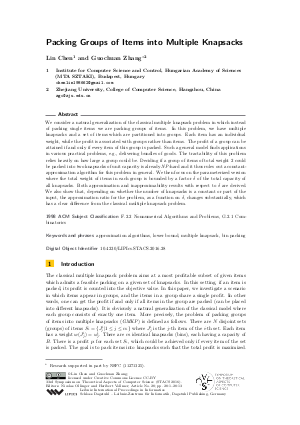Packing Groups of Items into Multiple Knapsacks
Authors Lin Chen, Guochuan Zhang
-
Part of:
Volume:
33rd Symposium on Theoretical Aspects of Computer Science (STACS 2016)
Part of: Series: Leibniz International Proceedings in Informatics (LIPIcs)
Part of: Conference: Symposium on Theoretical Aspects of Computer Science (STACS) - License:
 Creative Commons Attribution 3.0 Unported license
Creative Commons Attribution 3.0 Unported license
- Publication Date: 2016-02-16
File

PDF
LIPIcs.STACS.2016.28.pdf
- Filesize: 0.6 MB
- 13 pages
Document Identifiers
Subject Classification
Keywords
- approximation algorithms
- lower bound
- multiple knapsack
- bin packing
Metrics
- Access Statistics
-
Total Accesses (updated on a weekly basis)
0Document
0Metadata
Abstract
We consider a natural generalization of the classical multiple knapsack problem in which instead of packing single items we are packing groups of items. In this problem, we have multiple knapsacks and a set of items which are partitioned into groups. Each item has an individual weight, while the profit is associated with groups rather than items. The profit of a group can be attained if and only if every item of this group is packed. Such a general model finds applications in various practical problems, e.g., delivering bundles of goods. The tractability of this problem relies heavily on how large a group could be. Deciding if a group of items of total weight 2 could be packed into two knapsacks of unit capacity is already NP-hard and it thus rules out a constant-approximation algorithm for this problem in general. We then focus on the parameterized version where the total weight of items in each group is bounded by a factor delta of the total capacity of all knapsacks. Both approximation and inapproximability results with respect to delta are derived. We also show that, depending on whether the number of knapsacks is a constant or part of the input, the approximation ratio for the problem, as a function on delta, changes substantially, which has a clear difference from the classical multiple knapsack problem.
Cite As Get BibTex
Lin Chen and Guochuan Zhang. Packing Groups of Items into Multiple Knapsacks. In 33rd Symposium on Theoretical Aspects of Computer Science (STACS 2016). Leibniz International Proceedings in Informatics (LIPIcs), Volume 47, pp. 28:1-28:13, Schloss Dagstuhl – Leibniz-Zentrum für Informatik (2016)
https://doi.org/10.4230/LIPIcs.STACS.2016.28
BibTex
@InProceedings{chen_et_al:LIPIcs.STACS.2016.28,
author = {Chen, Lin and Zhang, Guochuan},
title = {{Packing Groups of Items into Multiple Knapsacks}},
booktitle = {33rd Symposium on Theoretical Aspects of Computer Science (STACS 2016)},
pages = {28:1--28:13},
series = {Leibniz International Proceedings in Informatics (LIPIcs)},
ISBN = {978-3-95977-001-9},
ISSN = {1868-8969},
year = {2016},
volume = {47},
editor = {Ollinger, Nicolas and Vollmer, Heribert},
publisher = {Schloss Dagstuhl -- Leibniz-Zentrum f{\"u}r Informatik},
address = {Dagstuhl, Germany},
URL = {https://drops.dagstuhl.de/entities/document/10.4230/LIPIcs.STACS.2016.28},
URN = {urn:nbn:de:0030-drops-57299},
doi = {10.4230/LIPIcs.STACS.2016.28},
annote = {Keywords: approximation algorithms, lower bound, multiple knapsack, bin packing}
}
Author Details
References
-
R. Adany, M. Feldman, E. Haramaty, R. Khandekar, B. Schieber, R. Schwartz, H. Shachnai, and T. Tamir. All-or-nothing generalized assignment with application to scheduling advertising campaigns. In Proc. of IPCO 2013, pages 13-24, 2013.

-
C. Chekuri and S. Khanna. A polynomial time approximaion scheme for the multiple knapsack problem. SIAM J. Comput., 35(3):713-728, 2006.

-
F. Eisenbrand, D. Pálvölgyi, and T. Rothvoss. Bin packing via discrepancy of permutations. ACM Trans. Algorithms, 9(3):39-49, 2013.

-
P. C. Gilmore and R. E. Gomory. A linear programming approach to the cutting-stock problem. Operations Research, 9:39-49, 1961.

-
R. L. Graham. Bounds on multiprocessing timing anomalies. SIAM J. Appl. Math., 17(2):416-429, 1969.

-
K. Jansen. Parameterized approximation scheme for the multiple knapsack problem. SIAM J. Comput., 39(4):1392-1412, 2009.

-
K. Jansen. A fast approximation scheme for the multiple knapsack problem. In Proc. of SOFSEM'12, pages 313-324, 2012.

-
K. Jansen, S. Kratsch, D. Marx, and l. Schlotter. Bin packing with fixed number of bins revisited. J. Comput. Syst. Sci., 79(1):39-49, 2013.

-
K. Jansen, F. Land, and K. Land. Bounding the running time of algorithms for scheduling and packing problems. In Proc. of WADS'13, pages 313-324, 2013.

-
D. S. Johnson. Near-optimal bin-packing algorithms. Doctoral Thesis. MIT Press, 1973.

-
H. Kellerer. A polynomial time approximation scheme for the multiple knapsack problem. In Proc. of APPROX'99, pages 51-62, 1999.

-
J. Matousek. Geometric discrepancy. Springer-Verlag, 1999.

